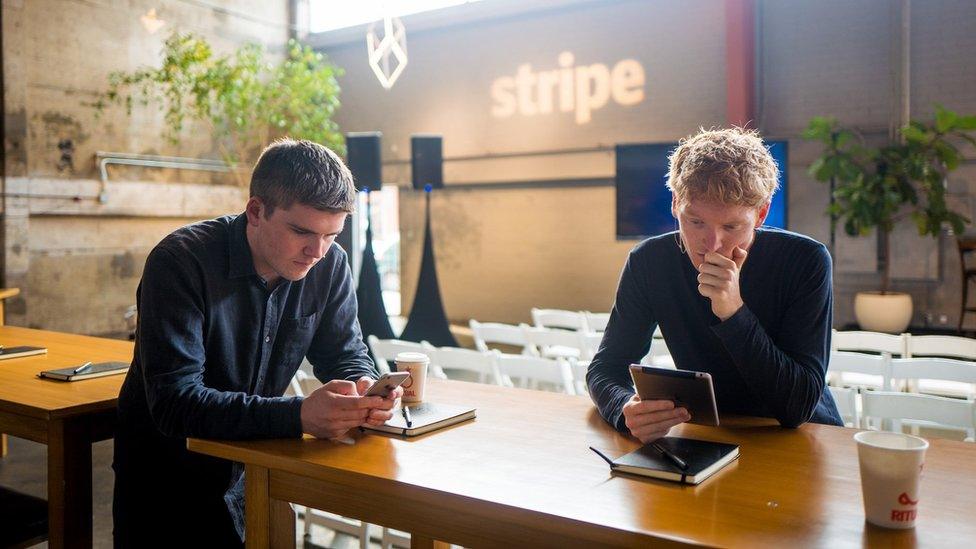At Stripe, a rethink on recruitment
- Published
- comments

Stripe was founded by John and Patrick Collison, and they're adding to the company by hiring complete teams
We achieve more when we work together, that's a given.
And as the glory of Leicester City has proven this past week, there's something magical, and unpredictable, about a great team coming together.
That blend of perfect personnel, timing, skill and downright good luck is almost impossible to create. And yet, when it comes to hiring for a job, it's what businesses the world over constantly try to do.
The recruitment world almost exclusively deals in individuals, despite the fact almost everything we do in the workplace is part of a team effort.
Impressive individuals are plucked from one successful team and implanted in another, like an organ in a new body - a body that could reject it, even if it's needed to survive and grow.

You can hear my interview with Patrick Collison on this week's edition of Tech Tent on the BBC World Service. Listen again or download our podcast here.

This happens in Silicon Valley, where the hiring process is often rigorous but mostly solo, unless you find yourself in a big company after being acquired - a process that often turns bitter when company cultures collide. (Further reading: Nest.)
When Patrick Collison explains, in his hybrid Irish-Californian accent, how he thinks he can fix all this, it seems so blindingly obvious.
He's the co-founder of Stripe, a mobile payments company based in San Francisco's trendy Mission District.
The company's looking to fill a range of new positions, but rather than hire individuals and hope they all hit it off, they're instead inviting teams of 2-5 people to apply all at once, external.
They call it BYOT - Bring Your Own Team.
"The basic notion that hiring should be oriented around individuals rather than teams is actually a surprising one, when you think about it," Mr Collison told me.
"We're trying to construct teams, yet we're only looking at individuals. That's an odd mismatch."
He calls it an experiment. And if you're the sort of person who feels held back by being bad at job interviews, it'll perhaps be a welcome idea.
Sometimes, the most effective people in teams aren't the best at promoting themselves, he says, or talking about their strengths.
And often, our entire lives are mapped out by how well we perform during 30 minutes of "what makes you right for this role?" and "what is your biggest weakness?" questioning.
Even worse, many people's futures can be dictated by the discriminatory whims of those they're trying to impress. In the tech industry, this problem is an ongoing crisis.
"In general in teams there are some people who are conventionally credentialed who tend to have little difficulty in obtaining jobs," explained Mr Collison.
"There are also some people who are very productive who for whatever reason are from a different educational background, different socio-economic background, different racial background.
"Because they don't 'look' the same, quote, unquote, they have more difficulty getting hired. It's a contributing factor to the lack of diversity that we continue to observe in the technology industry. I don't know how it's going to pan out in our case."
The scheme has been running for just over a week, but Mr Collison said initial data shows some promising trends. It's around a 50/50 gender split - with several husband and wife teams coming forward.
The "winning" team would likely be made up of software engineers, the company said, but it welcomed teams that have designers and project managers as part of the package.
What wouldn't happen, Mr Collison said, is some kind of awkward X-Factor moment - you know, when a group of excited hopefuls turn up together only to have Simon Cowell pick out the only one who can actually sing.
"We will make offers to all or none of the team," Mr Collison said.
"We're not going to put the team members in the position of trying to decide if they will boot one off the island to proceed with this.
"It doesn't feel good, so we're not going to do it."
Follow Dave Lee on Twitter @DaveLeeBBC, external and on Facebook, external
- Published10 February 2012
- Published30 March 2016
